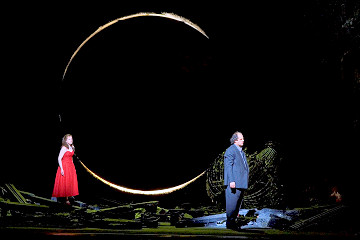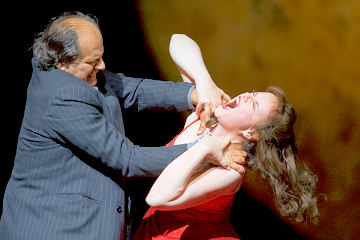Bartók, Duke
Bluebeard's Castle and Schoenberg, Erwartung:
soloists, orchestra of the Royal Opera House, Covent Garden
/ Kirill Petrenko. 26.05.06 (ED)
Duke Bluebeard's Castle:
Sung in Hungarian with English surtitles
Duke Bluebeard: Albert Dohmen
Judit: Petra Lang
Erwartung:
Sung in German with English surtitles
The Woman: Angela Denoke
The Man: Barry Callan (mute role)
Director: Willy Decker
Designs: John F. Macfarlane
Lighting: David Finn

In many ways Bartók’s only
opera and Schoenberg’s monodrama fit well together;
and their pairing pays dividends, given that in retrospect
the web of links between the two works grows ever more
complex. Neither composer, or their respective works for
that matter, should be thought of as easily approachable
in any sense and these stagings pull few punches. To emphasise
the fragility of the human states portrayed here, Willy
Decker places both works in a setting that recalls a bombed-out
Berlin or Dresden. Heightened human faculties such as
intellect or morality lie smashed in the ruins of depravity
as the set-dominating chandelier lies in the debris. That’s
the extent of subtlety here.
Bluebeard leads his new wife Judit over a threshold that
is scarcely more than rubble and at that moment their
troubles begin. Judit peels away the layers of Bluebeard’s
secret world by opening the doors of his castle to let
in light, or rather to bring the truth behind the rumours
circulating about him into the open. Doing so with such
determination seals her own incarceration behind the seventh
door. That Bluebeard does little or nothing to prevent
the inevitable happening is itself necessary of course,
given that it allows him to corner his unmasker in the
opera's final moments and to preserve his secret in endless
night.

Initial fears that both singers would
be spending more time watching their step rather than
exploring the dark recesses of Bartók’s sound
world soon subsided. Petra Lang’s Judit must be
counted amongst the most persuasive roles in her repertoire.
Bringing to it all of the required impetuousness, sureness
of purpose and sharp intellect that lies just under role’s
all too innocent surface (not to mention incisive timing,
musicality and a remarkable linguistic aptitude) she proves
that for her, Judit is no mere girl in a red dress dragged
in from the night.
Beside such a dominating assumption, one that has developed
through long experience, Albert Dohmen’s Duke Bluebeard
lacked definition. Textual nuances, pitch and timing all
showed prominent weaknesses, whilst his acting dithered
between the minimal or the extremely involved. The orchestra
handled Bartók’s writing knowingly, even
though the wind section appeared inexplicably amplified.
Kirill Petrenko displayed a keen ear for sonority and
fine judgement of the work’s internal dynamics.
Sonority and dynamic judgement are not as persuasively
found in Petrenko’s reading of Erwartung.
Schoenberg’s material is far denser than Bartók’s
and is thus much less open to characterisation. This has
led some to suggest that all one needs to do is play the
piece at the marked tempi and dynamics to ensure everything
is in place. In practice, it’s not quite that simple.
Employing largely the same set, though with it’s
debris partially rearranged, Schoenberg’s Woman
emerges from Bluebeard’s seventh door in an uncannily
familiar red dress. Her distracted state gives voice to
thoughts that might almost be found within a reversal
of Bluebeard’s central idea. Bluntness, angst, pain
and fear of anything and everything pervade the air as
the Woman stumbles distracted along the inner paths of
her mind. The work’s major challenge for a director
is how to represent that invisible void as to clarify
and illustrate the intricately set text for audiences.
Decker’s response is to have an actor make manifest
‘the Man’ of the Woman’s imagination.
By having him remain mute and in black, barely visible
against the set, it is indicated that she has no sense
of another physical presence. It is a concept that only
works partially, since much of the work’s power
rests in what is implied as opposed to that which can
be illustrated.
Whatever the staging, attention must focus on the Woman
and Angela Denoke grasped the fearsomely difficult role
with confidence. Her gutsy performance is a near ideal
balance of precision and emotion, in so far as Schoenberg
offers much room for manoeuvre. Curiously for a work that
has sparked much debate over how it deals with the passing
of time, Schoenberg’s score sounds increasingly
dated and such open advocacy of expressionist ideals through
absolute and direct musical language was something that
Schornberg eventually regretted.
Perhaps it is apppropriat that Erwartung’s
stifling musical claustrophobia ends abruptly, but it
does not bring a natural conclusion to an evening at the
opera. You might want to have the name of a good psychiatrist
to hand as you leave: Dr. Freud would not have become
the man he was without works like these.
Evan Dickerson
Jim Pritchard’s interview with Petra Lang in which
she talks about singing Judit is here
Pictures © Royal Opera House / Bill Cooper 2006




